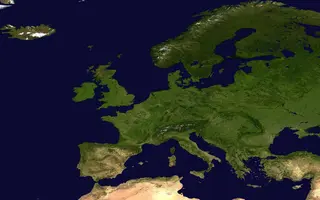
Millions of British citizens are casting their ballots in the decisive EU referendum this Thursday: Hospitality ON analyzes how this decision could affect the European hotel industry. In the United Kingdom, consequences of a "Brexit" would probably be very different from one region to another. Elsewhere in Europe, the impact of the vote could also be significant…
The sector is currently posting very positive performances, after six consecutive years of growth in both international arrivals and RevPAR – an impressive track record compared to most of Britain’s European neighbors… Close to 35.8 million foreign tourists visited the Kingdom in 2015, a 4% increase from last year. With around 60% of total visitors, European tourists represent the vast majority of arrivals and would be directly affected by a British withdrawal from the European Union. But how exactly?
Brexit supporters claim that it would be an additional opportunity for British tourism to grow, due to an exchange rate benefitting the foreign clientele. If the United Kingdom was to leave the European Union, the economic context could favor the Euro more than the Pound sterling. The latter would depreciate compared to the common currency, as current trends in the foreign exchange market have shown as the referendum approaches. A weaker Pound would make prices more attractive for potential visitors to the country.
On the other hand, “Bremain” supporters anticipate an increase in customs-related taxes for goods, and additional costs and constraints upon exit and entry on the British territory. These factors would have negative repercussions on various industries, with travel, tourism and transportation in the front line. Indeed, entry requirements could become more severe for European tourists, whereas they currently benefit from simplified procedures. Passports and visas could once more be necessary for certain foreign nationals. Earlier this year, EasyJet CEO Carolyn McCall was quoted in the Daily Express saying that Europe made tourism accessible to the masses, especially with regard to transportation. After they chose London as of their main transport hubs, the reaction of « low-cost » airlines in case of a Brexit is yet to be seen. Surprisingly enough, this question has not sparked much debate over the past few months. Indeed, one can wonder whether or not these airlines, intended for travelers from all around Europe, could realistically maintain such transport hubs on British territory. Probably not from every destination, and this could impact fares on flights to and from the United Kingdom. Could they follow the example of financial centers, and heed the siren song of cities such as Amsterdam, Frankfurt or Paris?
Depreciation of the Pound sterling, hampered access to the European market, threats for the stability of the City of London… the impact of a Brexit on the external drawing power of the British economy could affect business clientele in hotels, especially so in London. In the manner of its French counterpart, the UK hotel industry relies heavily on the capital. Yet even if the British currency was to depreciate, given the current average daily rates in London, the destination would remain more expensive than other European cities, thus limiting its interest for leisure customers. Similarly, business demand – the main driving force in the hotel industry – would be strongly affected by the economic impact of the Brexit in several aspects: financial and insurance services, real estate, etc. Hotels in the capital have little to gain and lots to lose if the Brexit becomes a reality, despite the expected gain in “competitiveness”.
The impact of a Brexit is less obvious when it comes to secondary or tertiary markets across the United Kingdom. Change in exchange rate should make foreign countries more expensive for British citizens, who remain a major source market for tourist destinations around the globe. The depreciation of the Pound sterling and a changing environment for transport hubs could encourage the British leisure clientele to favor domestic destinations. It should therefore come as no surprise that, according to opinion polls, English seaside resorts have become pro-Brexit strongholds… Reciprocally, European hotel markets focused on leisure tourism and benefitting from significant arrivals of British citizens (such as Spanish or Greek seaside resorts) should be negatively impacted.
With regard to business tourism, a potential gain in competitiveness following the depreciation of the Pound sterling should affect industrial, export-prone sectors (aerospace, consumer goods, automotive industry, etc.). This could sustain business demand in very specific geographic areas, such as Sunderland and Hucknall. Nation-wide, decreasing activity in construction and services should have a negative impact on business demand, and lasting consequences on the British economy should drag down hotel performance. The drop should be all the more significant as the United Kingdom had proven to be the most advanced European country in the current cycle of recovery, after bouncing back for seven years in a row following the subprime mortgage crisis. The risk of a lasting downturn, not to mention a contagion effect in Europe and worldwide, cannot be ignored. The 2012-2013 European debt crisis, triggered by countries with a much smaller economy, led to a stagnation or decrease in RevPAR.
The Brexit is not a reality at the moment. Yet its potential impact can already be assessed: the uncertainty surrounding the referendum led British companies to adopt more cautious attitudes since the beginning of the years. A victim of this wait-and-see policy (not to mention the security threats across Europe), the hotel industry registered a meager 0.7% increase in RevPAR from January to May 2016, compared to +4.6% in 2015 (including a +0.4% gain in occupancy rate and a +4.1% increase in average daily rate).
“Should I stay or should I go?” British hoteliers probably have different answers to this question, mostly depending on where they operate. Yet professionals in the tourism and hotel industry are paying close attention, as all of Europe waits for the result of the EU referendum.
Also Read:
- The United Kingdom remains among Europe's tourism leader in 2015
- Bristol's hoteliers embark on a journey to supply development
- Cardiff, a hotel supply under transformation
- Manchester sets goal to be one of Europe's tourism champions
- United Kingdom: the hotel industry converts the try in Rugby World Cup
- Scotland: how could independence affect tourism




